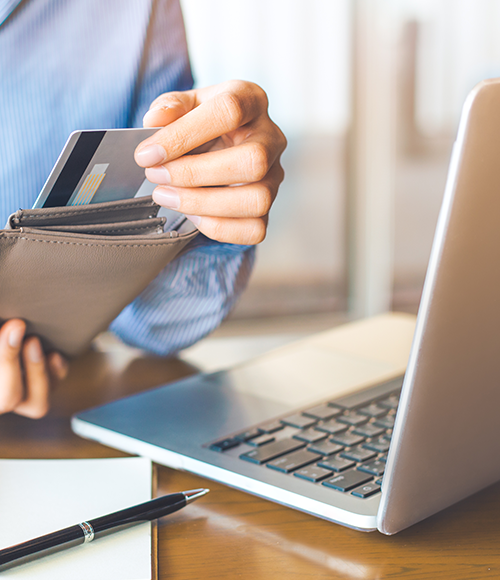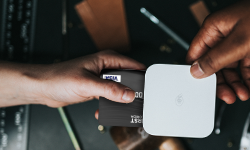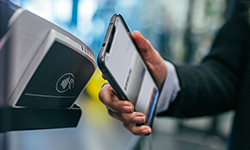
If, after filing your federal tax return with the IRS, you discover you owe the government money, you may be wondering what's the best way to pay off your balance. This question might be further complicated by how much you owe. Your options include online direct pay from a bank account, check, money order or cashier's check, cash via a participating retail store, debit card, digital wallet, installment plan, or credit card.
If you’re considering paying by credit card, here’s what you need to know:
According to the IRS website, "The IRS uses third-party payment processors for payments by debit and credit card. It's safe and secure; your information is used solely to process your payment." Each of the three payment processing companies charge a fee to the taxpayer for this service, ranging from 1.96% to 1.99% of your total bill. If you need to make a payment of $100,000 or more with a card, there are special requirements that apply and that the IRS website details. But that's probably not most people.
The three biggest considerations when paying your tax bill with a credit card are the interest rate of the card, the fee of the payment processor, and how it will affect your credit score.
Processing fee vs. credit card reward
It might be tempting to use a credit card to pay the IRS because you believe it could earn you big rewards from your credit card company. Let’s look more closely at this possibility to make sure it really does work in your favor (hint: it might not!).
First, you'll want to calculate what the service fee will be. Multiple your tax bill by the third-party processor fee rate, in this case somewhere between 1.96 and 1.99%. So, if you owed $5,000, you would pay between $98 and $99.50.
Second, you'll need to calculate the value of the rewards or points you would earn. Some credit card companies specifically state that they offer no rewards or points for charging your taxes to your card. If you are hoping to earn a reward like airline miles with your points, keep in mind that each earned point or mile is worth fractions of a penny, meaning it isn't likely you'll come out on top after you pay the service fee.
It might be worth paying your tax bill with a credit card if doing so would qualify you for a significant sign-up bonus—one that you wouldn't otherwise be able to achieve. Sign-up bonuses often require a large amount of money to be charged to the card within the first few months. Again, you need to make sure that whatever points or cash back you're earning is worth the processing fee and any interest you'd pay if you can't pay off the credit card balance in full right away.
Credit card interest rates
If you can't afford to pay off your credit card balance right away, no amount of rewards will offset both the processing fee and the interest you will pay. The average credit card interest rate is around 16%, with many introductory cards holding rates above 20%. If you can't afford the large tax bill now, there's a good chance you can't afford the money you would pay in interest over several months or years.
The one exception to this is if you can find a credit card offer with a zero percent introductory rate for a year. This would offer you, essentially, an interest-free payment plan over 12 months to pay back the IRS. This could be cheaper than an IRS payment plan as long as you can pay off the card in full before the standard rate kicks in.
Impact to your credit score
Charging a large amount of money to a credit card will increase your credit card utilization and your overall debt. Both of these will impact your credit score, most likely by lowering it. If you can pay off the balance immediately, it probably won't be a big deal for you. However, if you plan to apply for a loan shortly after charging your tax bill to a card, the effect on your credit score could change your loan qualification or interest rate.
Installment plan + credit card
The IRS offers installment plans, and the rate for short-term plans will likely be lower than the interest on a credit card for a similar timeframe. Long-term plans, however, come with some steep fees.
If you opt for an installment plan with the IRS and want to use a credit card for those regular payments, there is a maximum number of card payments allowed based on your tax type, i.e., the tax form you submit. For example, if you filled out a Form 1040, you can only make two card payments to the IRS in a year. Other situations might allow card payments twice per month or twice per quarter. So, make sure your plan doesn’t involve payments beyond this limit, or if it does that you can use another approved form of payment for those installments.
We're Here to Lend A Helping Hand
Our Members Can Save on TurboTax® and H&R Block® This Tax Season.
Get the tax help you need and special member savings with TurboTax and H&R Block.
TurboTax - File with the #1 best-selling tax software, to help you get your taxes done right, and get your maximum refund, guaranteed. PLUS, as a credit union member you can save up to $15 when you file with TurboTax.
Get started with TurboTax today!
H&R Block – Whether you want to meet with a tax pro in-office, via drop off, or send your documents virtually, let the tax pros do the rest. H&R Block will always get your biggest possible refund, guaranteed. PLUS, as a credit union member first-time filers receive $25 off their expert tax prep, and returning customers get the Tax Identity Shield® add-on.
Get your H&R Block coupon now and save!
Visit https://taxservices.lovemycreditunion.org for TurboTax and H&R Block offer details and disclaimers.
RESOURCES
« Return to "Blog"





